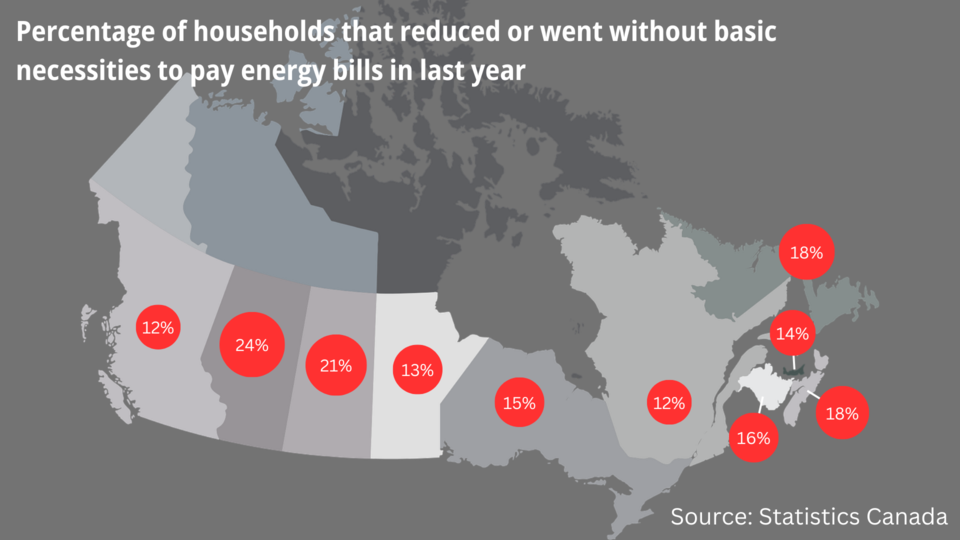One in seven Canadians reduced spending on, or went without, necessities like food and medicine to pay their energy bills in 2023, new data from Statistics Canada reveals.
The Canadian Social Survey on energy use found 15 per cent of household cut back on basic needs at least one month in the last year to pay their energy bills, and nearly eight per cent reported doing this for at least three months. Almost as many households said they kept temperatures at uncomfortable or unsafe levels because of heating or cooling costs.
In Alberta, 24 per cent of households reported they had to reduce or forgo essentials for at least one month to pay energy bills, the highest rate among the provinces, according to data obtained by Great West Media.
“I think it’s incredibly troubling. We’re talking about people having to turn down the heat – sometimes seniors or people who have children – having to deal with high or low temperatures in order to pay for basics like food,” said NDP energy critic Kathleen Ganley.
Ganley said she suspects more people in Alberta are struggling with their bills because electricity rates in the province increased significantly more than in other places, with prices this summer being four times higher than they were when the UCP were elected in 2019.
The short answer to why Alberta has much higher energy prices is “we have very limited competition,” said University of Alberta energy economist Andrew Leach.
“We had three big players, and today we have two, and they control a large share of the market. When we have those hours where the wind and the solar aren’t there and we’re reliant on generators from those few companies, the analysis showed that’s what made really high prices,” Leach said.
On Nov. 2, Alberta’s largest energy generator, TransAlta Corp., announced the $658 million acquisition of Heartland Generation, giving it control of just under 30 per cent of generating capacity in the province and further concentrating an already limited market.
The trend to concentration, and the high prices paid by consumers, can be traced to the expiration of Alberta’s 20-year Power Purchase Arrangements (PPAs) at the end of 2020, which put more power plants in the hands of fewer companies, according to researchers with the University of Calgary’s School of Public Policy.
Higher market concentration means firms can more easily engage in “economic withholding” and keep back some of their electricity supply to raise their offer prices. Reports from Alberta’s Market Surveillance Administrator show the monthly average capacity withheld and offered to the Alberta Electric System Operator at a higher rate has roughly doubled since the end of the PPAs.
“Affordability is a major concern for this province, especially as it comes to our electricity bills. We are looking at all options when it comes to addressing the affordability and reliability of the electricity grid; this includes issues over the regulated rate option and the transmission system,” a spokesperson for Affordability and Utilities Minister Nathan Neudorf said in a statement.
“These issues largely stem back to the NDP's early exit from coal without ensuring our grid was prepared to handle the influx of irregular wind and solar, which has led to spikes and volatility in the cost of electricity.”
Leach said the coal phase-out hasn’t made much of a difference in electricity price, and notes coal use has been declining everywhere in favour of cheap natural gas or other energy sources, and these phase-outs haven’t come with the price spikes seen Alberta.
“The reality is, look across the country and there’s only one jurisdiction where electricity prices have more than tripled in the last two years. And it's happened in Alberta, since the expiry of the power purchase agreements at the end of 2020.”



